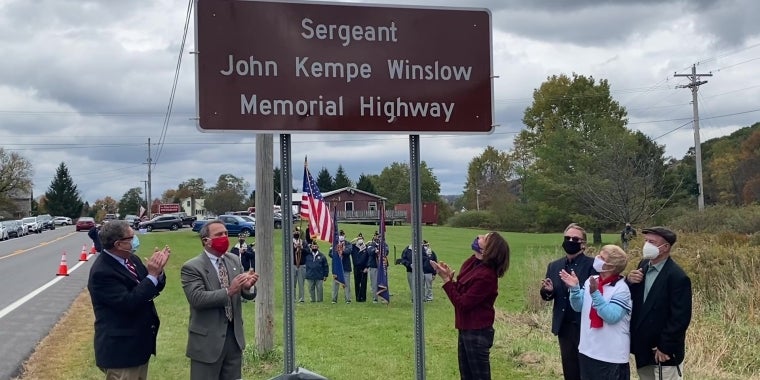
Seward Funds Ag Incubator Project With Environmental Twist: Bio Fuel Component Linked To Ag Preservation
Coxsackie, Greene County--State Senator James Seward, a distinguished member of the Senate Agriculture Committee, joined Greene IDA and local officials today to announce a State funding initiative totaling $40,000 to enhance efforts to establish an Agriculture Incubator in Greene County. The innovative approach to utilizing public open space and habitat-protected land for related ag uses is unique to the region. Projects included in the funding announcement were to develop the incubator project with an environmental component linked to Bio-fuels and a retail project connecting the ag products to the proposed retail destination park adjacent to Exit 21B of the NYS Thruway.
“This is a targeted, smart investment that will help local agriculture-related businesses and boost our farms and local food production,” Seward said. “In our economy, and with news reports about tainted foods, people are concerned about food quality, its origination, and supporting local agriculture. This is a step forward utilizing an innovative approach partnering with environmentally protected open space.”
Senator Seward, who has represented Greene County since 2002, has a strong track record advocating for the best interests of the agricultural community. He has helped a farmers’ market in Otsego County become a year-round program to help local farmers. In addition, he has helped dairy farmers by funding important farm safety initiatives and has fought to restore key agricultural funding in the state budget.
The Greene IDA has made significant investments in open space conservation. To date, the direct actions of the IDA have resulted in conservation of land for Greene Business & Technology Park and Kalkberg Commerce Park that exceeds 325 acres with approximately 150 acres potentially suitable for a duel use of low impact farming and habitat protection. In addition, the IDA’s experience in developing effective conservation strategies is increasingly being sought by other project sponsors in the area as they plan their projects. Over time, the open space conservation efforts of the IDA, matched by private development projects can provide an extensive land base that would be appropriate for low impact farming. This strategy also correlates to the goals of many local comprehensive plans which identify the preservation of agriculture and open space as a priority.
“Nationally, farming has suffered greatly due to increasing market pressure for lands that can be developed. Locally the Greene IDA is concerned that their efforts to set a new standard for open space conservation are having an unintended adverse effect by increasing the demand for agriculture lands. Whether a former farm is bought to develop a factory, or to set aside as forever wild, the impact on the economics of farming is exactly the same. Our ag strategy hopes to rectify and enhance the future of agriculture in Greene County,” explained Paul Slutzky – Greene IDA Board Chairman.
The Town of Coxsackie in partnership with the Greene IDA has also secured a $25,000 grant from the Office of Community Renewal for the purpose of developing a business plan and implementation strategy for the overall Ag Incubator project. The IDA will continue to work closely with the Greene Habitat Advisory Committee, regulatory agencies and other interested citizens as this program is advanced.
Lands dedicated to preservation can be managed for agricultural purposes such that effective habitat is preserved. By controlling the properties, the program can insure that farming is done in a manner that will have the least impact on target conservation species. The bio-fuel component of this plan hopes to identify future crops that can be both lucrative and environmentally friendly for the local farming community. While the Greene IDA is seeking to evaluate mutually beneficial uses of conserved lands, the program will not compromise habitat protection goals. The combination of active agriculture and habitat protection can also result in significantly more land being protected at a lower cost to the public.
Wayne Speenburgh, Chairman of the Greene County Legislature added, “The concept of an Ag-Incubator is highly consistent with goals set forth in the Greene County Agricultural Development and Farmland Protection Plan in 2002. Our new Agriculture Task Force is prepared to advocate and partner with implementation of this new initiative of the IDA.”
“Land prices are the biggest deterrent to younger generations entering into ag based business. Land that has been acquired by public funds for habitat conservation can provide an effective incentive to help develop new, low cost farm enterprises. This strategy accomplishes the goal of preserving ag as a lifestyle and preserves our valued rural character,” emphasized Coxsackie Town Supervisor Alexander Betke II.
New Baltimore Town Councilman Kevin Kuenster passionately added, “The Greene County IDA is taking the lead role in recognizing and promoting what has, in recent years, become the issue of our time. An economy crippled by its dependence on petroleum and soaring trade deficits must re-tool, innovate, and produce rather than consume. The concept of a self-sustaining community that produces much of its own food and energy and in the process creates good job opportunities is no longer utopian. Everything is becoming inextricably linked and the vision of a small farm incubator that utilizes open space and non-productive farmland to build small local businesses and produce safe reliable food to the region is an idea whose time has come. Add to that an “agricultural center” that sells and distributes these local products and an alternative energy facility that is fueled by cellulosic fuels such as willow and switch grass produced on our land. This is an exciting concept deserving of national attention.”
Andy Turner, Executive Director of the Agroforestry Resource Center of Cornell Cooperative added, “This project represents a key step forward in the commitment to building and sustaining a strong, local economy and makes a critical connection between agriculture production and the consumer. In order to achieve the goal of increasing the availability of locally produced food and energy we must invest in the farmers, the land and the infrastructure needed to bring theses products to local markets and local consumers. This project has the potential to address all of these issues in an innovative way.”
“These are the kind of smart investments that will help foster the future of agriculture, which is the backbone of the Upstate rural economy,” said Jeff Williams, Deputy Director of Public Policy for New York Farm Bureau. “We are grateful to Senator Seward for his continued commitment to the farm families of Greene County and all of New York.”



